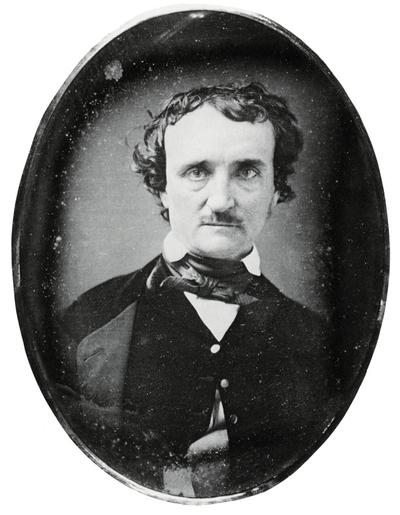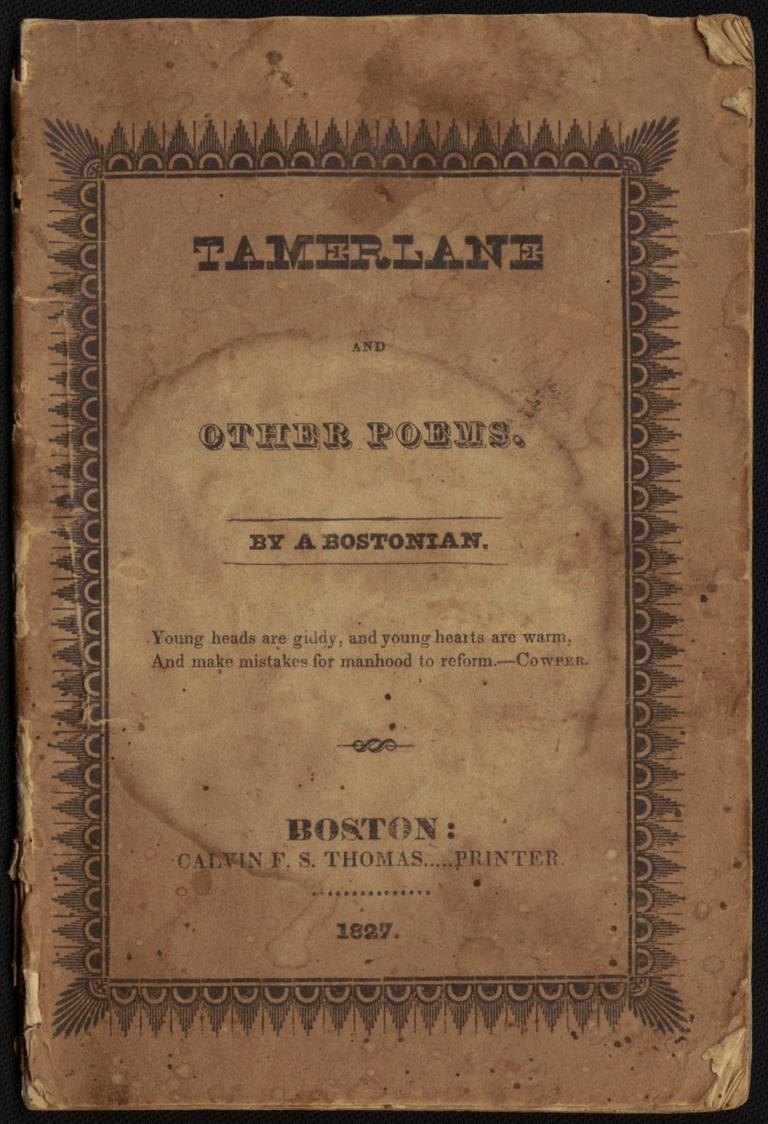Advertisement
The Great Poe Debate: Boston Fights For Literary Bragging Rights
The Boston Public Library's main branch becomes the scene of a brawl Thursday night. A verbal brawl, but a brawl nonetheless.
Three scholars will be duking it out in what's being called the "Great Poe Debate." The contenders?
- Paul Lewis, Boston College professor and Poe advocate
- Edward Pettit, also known as the "Philly Poe Guy"
- Jeff Jerome, curator of the Edgar Allan Poe House and Museum in Baltimore

They hail from the three cities that claim to deserve the biggest piece of Poe's notorious legacy, and they'll go to the mat Thursday over which was most influential in Poe's development as a writer.
Representing Boston, Paul Lewis has been leading an on-going crusade to reconcile Poe's relationship to the city where the dark wordsmith was born, but toward which he had a contemptuous relationship.
While Boston was undeniably Poe's birthplace — he was born in the city on Jan. 19, 1809 — he abandoned the literary scene here as a young man to move on to a few American cities, including Philadelphia, and then, ultimately, Baltimore. The master of the macabre died there on Oct. 7, 1849, four years after publishing one of his most memorable gothic tales, "The Raven" :
Excerpt:
And the raven, never flitting, still is sitting, still is sitting
On the pallid bust of Pallas just above my chamber door;
And his eyes have all the seeming of a demon's that is dreaming,
And the lamp-light o'er him streaming throws his shadow on the floor;
And my soul from out that shadow that lies floating on the floor
Shall be lifted - nevermore!
In an e-mail, Lewis made clear that Boston is where Poe published his first and last works, "as well as his most famous short story, "The Tell-Tale Heart" :
Excerpt:
It grew louder — louder — louder! And still the men chatted pleasantly , and smiled. Was it possible they heard not? Almighty God! — no, no? They heard! — they suspected! — they KNEW! — they were making a mockery of my horror! — this I thought, and this I think. But anything was better than this agony! Anything was more tolerable than this derision! I could bear those hypocritical smiles no longer! I felt that I must scream or die! — and now — again — hark! louder! louder! louder! LOUDER! — "Villains!" I shrieked, "dissemble no more! I admit the deed! — tear up the planks! — here, here! — it is the beating of his hideous heart!
In life, as legend has it, Poe took issue with Boston's puritanical attitudes. He found the literary scene to be uptight and moralistic. In turn, the literary scene didn't think very highly of Poe, either. The author often engaged in rhetorical combat with Cornelia Walter, the Boston Evening Transcript editor who gave a big "thumbs down" to one of Poe's public lectures.
Also, Poe didn't do so well financially in Bean Town.
In Boston's defense, Paul Lewis calls Poe's connections to places like Baltimore and Philadelphia "old news."
"Boston's claim is a different, new, change we can believe in!" Lewis said. "Also, every place he lived and worked as an adult treated him badly: paid him little, forced him to do grunt work, left him desperately poor. Places like Boston cannot be faced with that charge!"

Lewis also wants to make it clear that Poe didn't hate Boston. "He became the writer and critic we celebrate by reacting to and against ideas about what literature should be," Lewis said, "and to do that he associated with the croakers in Boston's Frogpondian literary circle."
Poe called Boston writers "Frogpondians" because he believed they endlessly croaked on and on about their moral views and beliefs. The moniker was used in good fun, though, according the Lewis.
One piece of ammunition Lewis will use Thursday night is that Poe published his first book of poetry, "Tamerlane and Other Poems," anonymously. Rather than using his name, Poe instead chose the byline "by a Bostonian".
Granted, the book was ignored by virtually everybody at the time.
Lewis believes Poe would've gotten a kick out of Thursday's public display of Poe-love. "For Edgar Allan Poe, literary criticism was a contact sport!" Lewis said, noting that, despite popular belief, the creepy writer had a provocative sense of humor.
"When he wrote that Bostonians are 'well bred' and, therefore, 'boring,' that our hotels were poor and our poetry not so good, but that our 'pumpkin pies were delicious,' he was at least half kidding," Lewis said.
"What he railed against was the preachy moralistic writing of authors like Lowell and Longfellow," he went on, "the 'so called poetry of the so called transcendentalist'; he was attacking highbrow literary purposes that have (as he predicted) led to the fading from sight of those very (croaking) Boston-area writers. Who reads Longfellow now even in schoolrooms?"
Oof. Sounds like fightin' words! Alert the folks at the Longfellow House in Cambridge!
Thursday night's oral warfare coincides with the opening of a new exhibition at the BPL, curated by Lewis, called "The Raven and the Frog Pond: Edgar Allen Poe and the City of Boston."
It includes some rarely displayed Poe-related materials from the library's special collections — hand-written original letters by Poe and letters to him, first editions of antebellum books Poe reviewed and the original periodicals in which he published his reviews, and illustrated volumes of Poe's works from the library's stacks.
The exhibition runs though March 31, 2010.
And this note: If you do go to the "Great Poe Debate," be sure to bring some hankies. In the spirit of Poe, it could get red "in the blood-bedewed halls of their revel."
This program aired on December 17, 2009. The audio for this program is not available.
